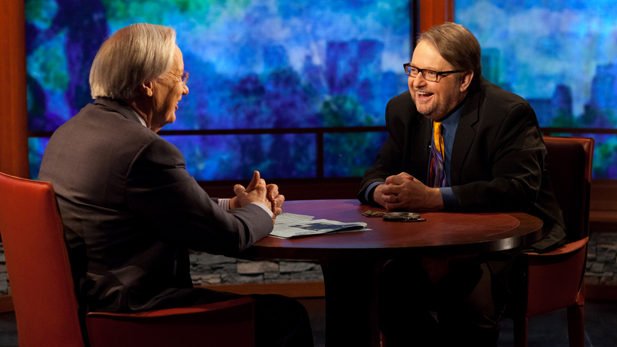 Bill Moyers interviews author Luis Urrea on Moyers & Company
Bill Moyers interviews author Luis Urrea on Moyers & CompanyWatch Moyers & Company as Bill Moyers interviews author Luis Urrea, Friday at 9 p.m. MST, PBS-HD6
By Michel Marizco, Fronteras Desk
 I owe Luis Urrea a book. He probably doesn’t remember it, but I still keep our last conversation tucked away: “Now write your f-----g book,” it says.
I owe Luis Urrea a book. He probably doesn’t remember it, but I still keep our last conversation tucked away: “Now write your f-----g book,” it says.
It sits there, annoying me when I just want a day off. But the truth is, I owe my old friend a lot more than that. I’ve often considered narrative non-fiction, the accurate reconstruction of events told with a fictional story’s flow, the height of journalism. And nobody’s done it better.
 I first met Luis (left) as any writer should be met, through his books; specifically, The Devil’s Highway.
I first met Luis (left) as any writer should be met, through his books; specifically, The Devil’s Highway.
It’s the definitive book of what happened during a hot week in May 2001 when a group of migrants illegally crossed the border through the Cabeza Prieta National Wildlife Refuge. Fourteen of them died, becoming known as the Yuma 14.
It was a morbid time to be a border reporter in Tucson. This particular U.S. Border Patrol sector topped the nation in the number of known deaths and in the number of apprehensions at a time when the Mexican diaspora to the U.S. was at its highest.
There’s been many efforts by writers, filmmakers, journalists and activists to bring these issues into the spotlight. But in the end, what grabbed me was Luis’ reconstruction of what happened out in the desert that hot week in May, right down to the clothes the migrants had packed for their travel north. I read that book in a single sitting and then read it again and a fifth time.
When I finally met Luis, there was that familiarity you sense around certain friends or family. Blustery, hard-edged, all belied by a sense of humor I could appreciate. Little twisted, very smart.
There were some long nights of beers and border talk; I couldn’t get enough of his travails through Sasabe, Sonora. Here was a guy who understood the twisting in one’s gut when you cross into a feral border town where you can feel all eyes immediately drawn to you. Not many friendly eyes, either, at least not at first.
Sasabe’s the kind of town where migrant smugglers live next to meth cookeries, and former U.S. Marines-turned-gangsters live on that side of the border to escape arrest warrants for felony assault in California. All across the street from a grade school where somehow decent people still manage to dress their kids up in school uniforms.
Needless to say, we had a lot to talk about.
Years later, Luis sponsored me for a journalism fellowship; writing up what remains to this day the most glowing recommendation letter I’ve ever received. It was so good in fact, it gives me pause when I stop to think of his current successes as a writer of fiction.
I thanked him profusely for that and was about to walk away when a new message popped up.
“Now write your f-----g book.”
Well, Luis, old friend, guess what? I’m still working on it.

By submitting your comments, you hereby give AZPM the right to post your comments and potentially use them in any other form of media operated by this institution.